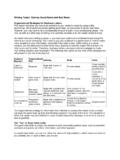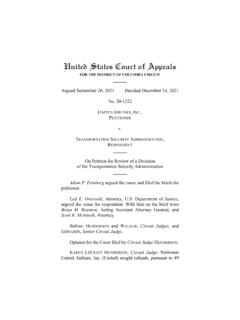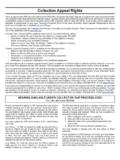Transcription of TheWhistleblower Claim Process
1 TheWhistleblower Claim Process What qualifies for an award? How do whistleblowers submit a Claim for award? What happens to a Claim after the IRS receives it? Communicating with the Whistleblower Office after a Claim is submitted How do I request an update on the status or stage of my Claim ? How do I request more information about my award determination? Whistleblower Process Timeline Common Reasons for Initial rejection / Denial of Claim iPublication 5251 (Rev. 10-2019) Catalog Number 68937A Department of the Treasury Internal Revenue Service What qualifies for an award? Internal Revenue Code (IRC) section 7623 provides for awards, in some cases mandatory, when the Internal Revenue Service (IRS) takes action based on a whistleblower s information.
2 Claims for award that provide specific and credible information regarding tax underpayments or violations of internal revenue laws and that lead to proceeds collected may qualify for an award. The Bipartisan Budget Act of 2018 defined proceeds as penalties, interest, additions to tax, and additional amounts provided under the internal revenue laws, as well as any proceeds arising from laws for which the IRS is authorized to administer, enforce, or investigate. This ncludes criminal fines, civil forfeitures, and violations of reporting requirements. In general, the IRS will pay an award of at least 15 percent, but not more than 30 percent of the proceeds collected attributable to the information submitted by the whistleblower.
3 The award percentage decreases for claims based on information from public sources or if the whistleblower planned and initiated the actions that led to the noncompliance. Awards will be processed as either a section 7623(a) or 7623(b) award. To qualify for the IRC section 7623(b) award program, the information must: Relate to a tax noncompliance matter in which the tax, penalties, interest, additions to tax, and additional proceeds in dispute exceed $2,000,000; and Relate to a taxpayer, and for individual taxpayers only, one whose gross income exceeds $200,000 for at least one of the tax years in question. If a submission does not meet the criteria for IRC section 7623(b) consideration, the IRS will consider it for the discretionary program under IRC section 7623(a) of the Code.
4 How do whistleblowers submit a Claim for award? Whistleblowers must use IRS Form 211, Application for Award for Original Information, and ensure that it contains the following: A description of the alleged tax noncompliance, including a written narrative explaining the issue(s). Information to support the narrative, such as the location of assets and copies of books and records, ledger sheets, receipts, bank records, contracts and emails. A description of documents or supporting evidence not in the whistleblower s possession or control, and their location. An explanation of how and when the whistleblower became aware of the information that forms the basis of the Claim . A complete description of the whistleblower s present or former relationship (if any) to the subject of the Claim (for example, family member, acquaintance, client, employee, accountant, lawyer, bookkeeper, customer).
5 It frequently takes 5 to 7 years, or more, to complete the Process . Taxpayers may exercise the right to administrative and judicial appeals, which can take many years to resolve. The IRS can only pay awards from proceeds collected because of the information provided by the whistleblowers. If the taxpayer does not (or cannot) pay, the Whistleblower Office must wait for the ten-year collection statute to expire before making a determination. Communicating with the Whistleblower Office after a Claim is submitted IRC Section 6103 requires the Whistleblower Office to keep taxpayer returns and return information confidential. In response to a phone call, the Whistleblower Office will only tell whistleblowers if their Claim is open or closed.
6 The Whistleblower Office is only authorized to provide additional information in response to a written request for a status/stage update or as part of a decision or determination letter . The Whistleblower Office will tell whistleblowers if it decides that an award is payable (and the amount) or that their Claim was rejected or denied (see flow chart for descriptions). The Whistleblower Office will notify the whistleblower if the Claim is referred for audit or examination, but this does not mean an audit or examination has been or will be opened. This notification does not mean the Claim will receive an award. The Whistleblower Office will notify the whistleblower if the subject of the whistleblower Claim makes a tax payment related to the tax period for which the information provided by the whistleblower relates.
7 It may take several years from the date of notification before a final resolution of all tax matters has occurred. The fact that the taxpayer makes a payment or payments does not guarantee an award will be issued. The whistleblower s original signature on the declaration under penalty of perjury (a representative cannot sign Form 211 for the whistleblower) and the date of signature. Whistleblowers must mail (the IRS will not accept faxed or electronic claims) Form 211 to: Internal Revenue Service Initial Claims Evaluation Team 1973 N. Rulon White Blvd. M/S 4110 Ogden, UT 84404 What happens to a Claim after the IRS receives it? If the Whistleblower Office decides the Claim warrants further consideration, the allegations are forwarded to the appropriate IRS operating division(s) for further development.
8 A subject matter expert may contact the whistleblower to make sure that the IRS fully understands the information submitted by the whistleblower. If the IRS does not use the information, the Whistleblower Office sends the whistleblower a Claim rejection or denial letter . If the IRS decides the Claim warrants further consideration, the Claim is forwarded to the field for examination or investigation. How do I request an update on the status of my Claim ? Generally, the Whistleblower Office will not disclose to whistleblowers whether the IRS took actions such as an audit, a collection proceeding, or a criminal investigation. The Whistleblower Office will provide a written response to written requests for information on the status and stage of any investigation or action related to a Claim when the request meets the following criteria: Requests must be in writing.
9 The Whistleblower Office will not accept faxed or electronic requests. The whistleblower must have filed a Form 211. Requests must be made by the whistleblower or a designee of the whistleblower with a properly executed Form 2848, Power of Attorney and Declaration of Representative, on file with the Whistleblower Office. Requests must state the Claim number to which the inquiry relates. Requests must state the whistleblower is requesting information on the status or stage of any investigation or action related to their Claim . Requests must be mailed to: Internal Revenue Service 1973 N. Rulon White Blvd. M/S 4110 Ogden, UT 84404 The Whistleblower Office will not respond to more than one request per Claim number per calendar year.
10 The Whistleblower Office will respond in writing to the address the whistleblower provided on the Form 211 or to an updated address, if provided. The response will indicate whether the Claim is open or closed. If the Claim is open the response will state the status and stage of any investigation or action related to the Claim . This will be limited to one of the following responses: Your Claim is currently in the Intake/Classification stage. The subject of your Claim is currently in the OD Field/Investigation stage. The subject of your Claim is currently in the OD Field/Suspense stage. The subject of your Claim is currently in the Appeals stage. The subject of your Claim is currently in the Collection/Suspense stage.














